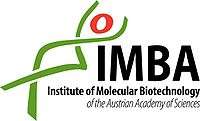Institute of Molecular Biotechnology
 | |
| Founded | 1999 |
|---|---|
| Headquarters |
Dr. Bohr-Gasse 3 1030 Vienna Austria |
| Website | http://www.imba.oeaw.ac.at/ |
The Institute of Molecular Biotechnology (IMBA) is an independent research organisation founded as a joint initiative of the Austrian Academy of Sciences in cooperation with the pharmaceutical company Boehringer Ingelheim. IMBA operates in close collaboration with the Research Institute of Molecular Pathology, Boehringer's basic research center both located next to each other at the Vienna Biocenter (VBC).
Research
IMBA's research aims to understand the fundamental molecular biological processes and is currently focused on cell biology, RNA interference, and epigenetics.
Associated projects
The Vienna Drosophila RNAi Center (VDRC) is located at IMBA, and is available to researchers worldwide.[1] It collects an RNAi library of over 22,000 Drosophila strains.
History
The Institute of Molecular Biotechnology was founded in 1999 as a joint initiative of the Austrian Academy of Sciences and Boehringer Ingelheim. The Austrian Government and the city of Vienna would also contribute to its funding and in 2002 the geneticist Josef Penninger started as the Scientific Director of IMBA who would recruit Barry Dickson as the first group leader; Dickson became managing director of the neighbouring institute Research Institute of Molecular Pathology (IMP) in 2006.
The construction of the institute started in 2003 and completed in 2006. The institute lies wall-to-wall with the IMP, to enhance collaborations and with whom they share the scientific facilities.
IMBA went on expanding and in 2007 the Vienna Drosophila RNAi Center (VDRC) in collaboration with the IMP is opened.
Since 2007 IMBA has a Scientific Advisory Board (SAB) for decision making chaired by Nobel prize winner Eric Kandel.
Awards
Being a newcomer in the Molecular Biology community, the IMBA has soon received recognition in the form of awards to its researchers and grants for projects. Josef Penninger, the scientific director, has been elected as a full member of The Austrian Academy of Sciences (ÖAW). He has been awarded the Ernst Jung Prize for Medicine by the Jung-Stiftung for Science and Research, the Descartes Prize for Research by the European Commission and has received the Carus-Medal of the German Academy of Sciences Leopoldina. In 2012, Josef Penninger was awarded with the Innovator Award for his project "Novel Approaches to Breast Cancer Prevention and Inhibition of Metastases" through the US Department of Defense.
In 2013 Josef Penninger received his second European Research Council’s (ERC) Advanced Investigator Grant for his research in the field of haploid stem cells.
Jürgen Knoblich, deputy scientific director at IMBA, was recognized with the Wittgenstein Award, awarded by the Austrian Ministry of Science.
The institute has also received support by the European Research Council and Kazufumi Mochizuki has received one of the European Research Council's first "ERC Starting grants".
Science Communication
In collaboration with the incorporated society Dialog Gentechnik, in 2006 IMBA opened the Vienna Open Lab, a hands-on biomolecular laboratory open to the public.[2]
References
- ↑ "Fly House". IMBA - Institute of Molecular Biotechnology. Retrieved 2018-02-17.
- ↑ "Open Science". Open Science (in German). Retrieved 2018-02-17.